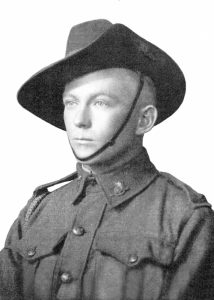The following is a typed edition of a copy of an affidavit
IN THE MATTER of War Crimes
And
IN THE MATTER of Atrocities
Committed at Osaka Camp No. 9.
NOTAGAWA
United Nations War Crimes
Commission Reference …………
I, Michael John LEAHY, care of Bohemia Hotel, Murray Street, Perth, Medical Orderly, make oath and say as follows:
-
I was a member of the 2/4 M.G. Bn. and was taken prisoner in Singapore in February 1942.
-
My Army number was WX 9312.
-
In 1943 I was moved to Japan and in June 1945 I was moved to OSAKA Camp No. 9, NOTAGAWA, where I remained until the end of the war.
-
Food. We were given three alleged meals per day, 90% of which during the whole period I was in the camp consisted of boiled rice moistened with boiled cucumbers. The quantity of rice for each meal was the equivalent of a breakfast cupful. Once per fortnight the meal was varied and we were given a similar amount of rice, but in lieu of the boiled cucumber we received approximately 1 oz. of boiled meat and part of the liquid in which the meat had been boiled.
-
The camp had a fortnightly ration of tea which only lasted for one week. There was no milk or sugar supplied with the tea.
-
Medicines. I know nothing concerning the medicines which were supplied as I was never in the R.A.P.
-
Clothing. We were given an issue of clothing consisting of khaki coat, shirt and trousers. There were no underclothes or socks. Boots were issued to only a very few Prisoners-of-war and large numbers of them were compelled to go barefooted during summer and winter through the lack of boots.
-
Quarters. These consisted of huts made from pine with bark roof. They were quite airy but when it rained the roofs leaked very badly.
-
Red Cross parcels. During the three months I was in the camp I only received a quarter of one parcel. It was common knowledge that the Japanese had stated that they had a perfect right to take the Red Cross Parcels.
-
Working conditions. The work to which I was engaged was the building of a causeway across a lake. It consisted of loading (rail) trucks and pushing them along a rail track and emptying them into the lake. Work commenced at 7 a.m., continuing until midday; recommenced at 1 p.m. and finished a 6 p.m. The work was very dirty and unpleasant as it was necessary to work in water for considerable periods at a time.
-
Tortures and beatings. For breaches of discipline such as taking a rest, breaking tools, stealing vegetables or failing to salute, prisoners were subjected to tortures by the following methods:
(a) a man would be compelled to hold a bucket of water above his head. He could only do this for approximately ¼ hour and as soon as he made any attempt to put the bucket down he was thrashed and beaten with bamboos and compelled to keep the bucket of water above his head for a further period. This went on for periods up to three or four hours when a man could no longer stand. At the end of the torture, in some cases, they would collapse.
(b) beatings with bamboos was inflicted for minor breaches of discipline and consisted of four or five Japanese thrashing a prisoner with bamboos. The prisoners stood as long as they could for as soon as they fell to the ground they were attacked by the Japanese with their boots and then compelled to get up and take more beating until such time as they collapsed completely.
(c) On one occasion I was passing the guard tent and saw six or seven Japanese surrounding an English prisoner. One Japanese was pushing a bamboo stick up the Englishman’s nostrils. He would pull the stick out and push it up again. The Englishman was in front of the guard tent three or four hours and his torture went on periodically until he finally collapsed. I do not know the name of the Englishman or the name of the Japanese who perpetrated the crime.
-
Once or twice a week we were compelled to run for the last half mile back to the camp from our work, and on reaching the camp would be made to do P.T. for approximately ¼ hour. This was done for no apparent reason and it was very hard on the prisoners after a hard day’s work, and also as they were all suffering from malnutrition.
-
I know HIGHASHI JUORI who was the Camp Interpreter and was well-known to myself and all other prisoners. As he was the interpreter all negotiation had to be carried on through him, and it was the general opinion of all the prisoners in the camp that he did not interpret requests and explanations for breeches of discipline correctly. The result was that whereas other prisoners would on some occasions get additional rations in the way of rice, the Australian prisoners would not receive the ration and it was assumed that this was through the action of HIGHASHI. On one occasion HIGHASHI asked Australian prisoners to donate their pay to buy a present for the Commandant. They refused and HIGHASHI informed us that we would be very sorry. From that time on all the unpleasant and very hard jobs were given to the Australian prisoners.
SWORN by the said Michael John LEAHY
at Perth in the State of Western Australia
this 23rd day of October 1946.
Before me:
A Commissioner for taking
Affidavit in the Supreme
Court of Western Australia
This document was signed by Leahy.
Leahy spent 2 months in hospital on his return.

